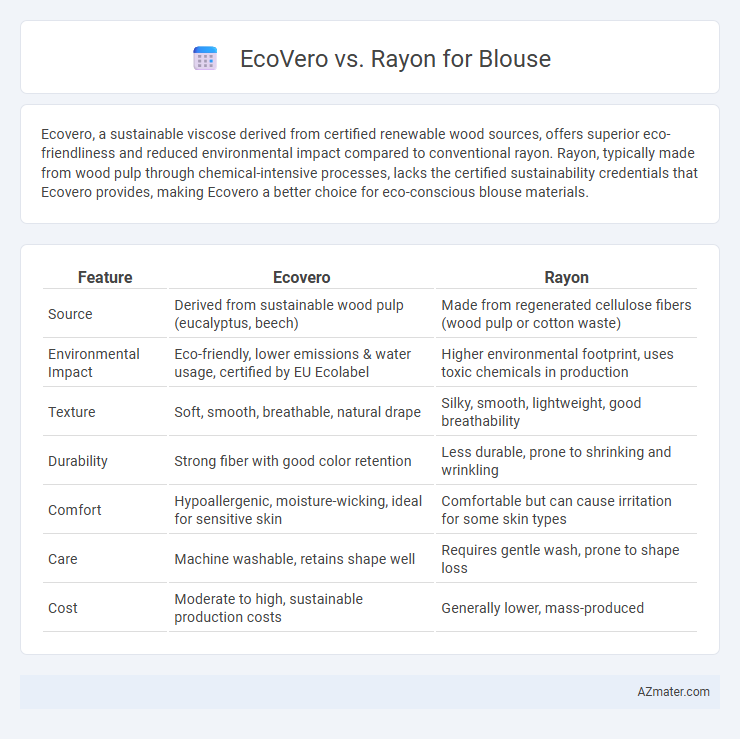Ecovero, a sustainable viscose derived from certified renewable wood sources, offers superior eco-friendliness and reduced environmental impact compared to conventional rayon. Rayon, typically made from wood pulp through chemical-intensive processes, lacks the certified sustainability credentials that Ecovero provides, making Ecovero a better choice for eco-conscious blouse materials.
Table of Comparison
| Feature | Ecovero | Rayon |
|---|---|---|
| Source | Derived from sustainable wood pulp (eucalyptus, beech) | Made from regenerated cellulose fibers (wood pulp or cotton waste) |
| Environmental Impact | Eco-friendly, lower emissions & water usage, certified by EU Ecolabel | Higher environmental footprint, uses toxic chemicals in production |
| Texture | Soft, smooth, breathable, natural drape | Silky, smooth, lightweight, good breathability |
| Durability | Strong fiber with good color retention | Less durable, prone to shrinking and wrinkling |
| Comfort | Hypoallergenic, moisture-wicking, ideal for sensitive skin | Comfortable but can cause irritation for some skin types |
| Care | Machine washable, retains shape well | Requires gentle wash, prone to shape loss |
| Cost | Moderate to high, sustainable production costs | Generally lower, mass-produced |
Introduction to Ecovero and Rayon
Ecovero is an environmentally friendly viscose fiber produced from certified sustainable wood sources, known for its lower environmental impact and reduced carbon emissions compared to traditional viscose. Rayon, a semi-synthetic fiber derived from cellulose, offers a soft, breathable fabric ideal for blouses but often involves chemical-intensive processes that raise environmental concerns. Choosing Ecovero over conventional rayon supports sustainable fashion by combining comfort and eco-conscious manufacturing practices.
What is Ecovero?
Ecovero is a sustainable fabric made from certified renewable wood sources, produced using a low-impact process that reduces water and energy consumption compared to traditional viscose. Rayon, often derived from similar cellulose sources but with less stringent environmental controls, lacks Ecovero's certified eco-friendly credentials. For blouses, Ecovero offers a soft, breathable feel with enhanced sustainability, making it an ideal choice for eco-conscious fashion.
What is Rayon?
Rayon is a semi-synthetic fiber made from regenerated cellulose derived from natural sources like wood pulp, offering a soft, breathable texture ideal for blouses. Unlike Ecovero, which is an eco-certified viscose with reduced environmental impact, conventional rayon production often involves intensive chemical processing and higher water consumption. Rayon blouses provide a silky appearance and comfort but may lack the sustainability credentials associated with Ecovero fibers.
Environmental Impact: Ecovero vs Rayon
Ecovero fibers produce 50% less CO2 and consume significantly less water compared to traditional viscose rayon, making them a more sustainable choice for blouse manufacturing. Ecovero is certified by the EU Ecolabel, ensuring strict environmental criteria are met throughout production, whereas conventional rayon often involves toxic chemicals and deforestation. Choosing Ecovero blouses reduces environmental harm by minimizing resource use and chemical pollution relative to standard rayon options.
Softness and Comfort Comparison
Ecovero fabric offers superior softness and breathability compared to traditional rayon, making it an excellent choice for blouses designed for all-day comfort. Derived from sustainably sourced wood pulp, Ecovero's eco-friendly production enhances fabric smoothness while maintaining moisture-wicking properties, reducing skin irritation. Rayon, while soft, often feels heavier and less breathable, which can compromise comfort during extended wear.
Breathability and Moisture Absorption
Ecovero fabric, derived from certified sustainable viscose, offers superior breathability due to its open fiber structure that enhances airflow in blouses, keeping the skin cool. Rayon, while soft and smooth, tends to retain moisture longer, which can reduce comfort in warm conditions as it absorbs but dries slowly. For blouses, Ecovero is preferred for optimal moisture absorption and faster drying properties, promoting better skin comfort and freshness throughout wear.
Durability and Longevity
Ecovero fibers, derived from sustainable wood sources, exhibit strong durability due to their high wet and dry strength, making them ideal for blouses that withstand frequent washing. Rayon, often made from chemically processed cellulose, tends to have lower tensile strength and can weaken with repeated laundering, reducing blouse longevity. Exploring Ecovero blouses ensures enhanced durability combined with eco-friendly credentials, while rayon options may require more delicate care to maintain fabric integrity.
Blouse Design and Aesthetics
Ecovero fabric offers a sustainable, eco-friendly option for blouse design with a smooth texture that enhances drape and comfort, providing a modern, luxurious aesthetic. Rayon, known for its softness and breathability, allows designers to create flowy, lightweight blouses that emphasize fluidity and elegance in silhouette. Both materials support intricate detailing and vibrant color retention, but Ecovero stands out with its environmentally responsible production, appealing to conscious fashion consumers.
Price and Value for Money
Ecovero fabric offers a sustainable and eco-friendly option for blouses, typically priced slightly higher than rayon due to its certified production process and lower environmental impact. Rayon, made from regenerated cellulose fibers, tends to be more affordable but may lack the same level of sustainability and durability. Choosing Ecovero provides better value for money for consumers prioritizing eco-conscious fashion without compromising on softness and breathability.
Which is Better for Blouses: Ecovero or Rayon?
Ecovero, made from sustainably sourced wood pulp, offers enhanced breathability and eco-friendliness compared to traditional rayon, making it a superior choice for blouses focused on comfort and environmental impact. Rayon, while smooth and versatile, often involves intensive chemical processes that can affect durability and sustainability. Choosing Ecovero for blouses ensures better moisture management and a reduced carbon footprint without sacrificing the soft, drapey feel typical of rayons.

Infographic: Ecovero vs Rayon for Blouse
 azmater.com
azmater.com